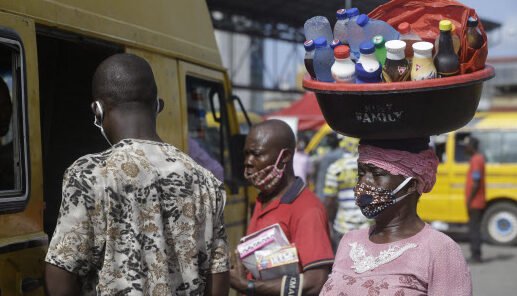COVID-19: The economic impact on Nigeria labour market

Workers and businesses are facing catastrophe, in both developed and developing economies… We have to move fast, decisively, and together. The right, urgent measures could make the difference between survival and collapse.
Guy Ryder, International Labour Organisation’s (ILO) Director-General made the quote above on the 7th of April 2020. Then, Nigeria had gradually started taking steps needed to combat the COVID-19 pandemic. Steps that changed many aspects of normal life.
Schools closed, and worshippers could no longer gather in church on Sundays or the mosque for Friday prayers.
With domestic and international restrictions on movement hampering trade and travel, most businesses also had to stop, reduce or alter operations. Productivity became challenging, and amidst several growth projections, McKinsey says Africa’s GDP growth in 2020, could reduce by three to eight percentage points. From 3.9% to -3.9% in the worst case scenario.
Although this crisis will be eventually managed, the effects will likely remain long after, especially on the labour market.
Employers will struggle
SMEs are responsible for most of Nigeria’s employment. They account for 96% of businesses and 84% of jobs (compared to 53% in the US, 60% in South Africa and 65% in Europe). For the last five years, they have contributed to around half of Nigeria’s GDP.
Most of the 40 million small businesses in the country are ill-equipped to handle a crisis of this scale, and the focus has switched to survival.
Sectors identified as most impacted by COVID-19 include tourism, leisure, aviation, manufacturing, construction, and real estate. This is because the current restrictions in place hamper the ability of these businesses to function and generate revenue.
For example, airlines remain grounded and have made next to zero revenue in weeks, continuing to incur costs of maintenance of their aircraft. According to Arik’s CEO, the airline has suffered a sharp decline of over 98% in revenue since the suspension of scheduled flights.
In Nigeria’s aviation industry alone, the International Air Transport Association (IATA) estimates a loss of 3.5 million passengers, due to restrictions necessary to curb the pandemic, resulting in over $760 million in lost revenue.
The situation is similar in the manufacturing sector, as factories and cities have been shut down and a large portion of the labour force demobilised.
In addition to a dip in revenue, executives will still have to grapple with the additional impact of the pandemic, on some of its business risks such as regulatory compliance, exchange rate volatility; as well as fiscal and monetary policy risks.
…and employees will be hard hit
Companies will make some tough decisions in the coming weeks, especially concerning thier employees.
Arik recently announced that it had ordered 90% of its staff to proceed on leave without pay until further notice, and implemented an 80% salary cut for April. IATA projects that the number of jobs at risk in the country’s aviation industry is 91,380.
In 2017 (pre-COVID 19), the National Bureau of Statistics (NBS) reported that Nigeria’s unemployment rate rose to 23.1% and underemployment rose to 16.6%, with over 20 million Nigerians currently unemployed. This figure is likely to increase significantly with the impending job losses as a result of the pandemic.
Before COVID-19 spread worldwide – global unemployment already stood at around 190 million. These numbers have multiplied in a matter of weeks. By the ILO’s analysis, the impact of the COVID-19 pandemic far exceeds that of the 2008-2009 financial crisis. They expect that COVID-19 will wipe out 7% of working hours globally in the second quarter of 2020 – equivalent to 195 million full-time workers.
Arguably, some sectors (such as e-Commerce, Information and Communication Technology, healthcare, medical supply and services) are cushioned against the adverse effects of COVID-19.
However, hiring activities and other expansion plans may be put on hold, at least for the coming months, given the general economic strain and a looming recession.
Government’s response
In difficult times like this, those most affected look to the government for support. In the UK, the government has promised to pay wages of employees at risk of losing their job. We have seen similar initiatives in Canada, Europe and other parts of the world. In the US, the Trump administration is currently pushing through a $2 trillion stimulus package that includes payments to taxpayers as well as bailouts for hard-hit industries to mitigate Covid-19’s impact.
A coordinated and effective response from the government is expedient. There were reports of looting in some parts of Lagos and Ogun states, which shows the level of the current hardship.
In a bid to incentivise businesses to retain employees, the government has tabled an Emergency Economic Stimulus Bill 2020 before the house.
The bill states that any company that does not retrench staff between the 31st of March 2020 and the 31st of December 2020 (except for reasons related to a breach of Labour Act) will get a 50% tax refund.
This is a positive step and may encourage businesses to retain their employees and save jobs. How the government plans to finance the tax refund and pay its workers, is, however, not clear. The finance ministry has reviewed non-oil revenue projections downwards considering expected fall in tax revenue, customs receipts etc.
The government is keen to keep employees from losing their jobs. The Central Bank of Nigeria (CBN) recently suspending banks for laying off their staff.
Moving forward
In times like this, employees, especially in the most vulnerable sectors earlier highlighted, need to start looking at options for alternative sources of income in the likely event that layoffs continue.
For employers that will be in distress, the priority should be survival, and all policies and actions taken must be geared towards that. Should they be forced to lay off staff, all legal bases must be adequately covered to avoid any litigation or additional business risks in the future. Even the reputational damage could be hard to recover from.
For the government, given the situation with oil prices, cash is indeed tight. However, in times like this, government intervention remains very key in the short and long term, not only in terms not only of survival, but also to be able to emerge from the crisis with strength.
The government has to reduce its costs of operation to a minimum and tap into loans and grants from the international community.
As the ILO has noted, without appropriate policy measures, workers face a high risk of falling into poverty.
On post-COVID-19 recovery priorities, these must centre around stimulating the economy and employment. Support for SMEs can also not be overemphasised, given their significance to the Nigerian economy.
Follow this writer on Twitter @iamrilwan. Subscribe to read more articles here.





